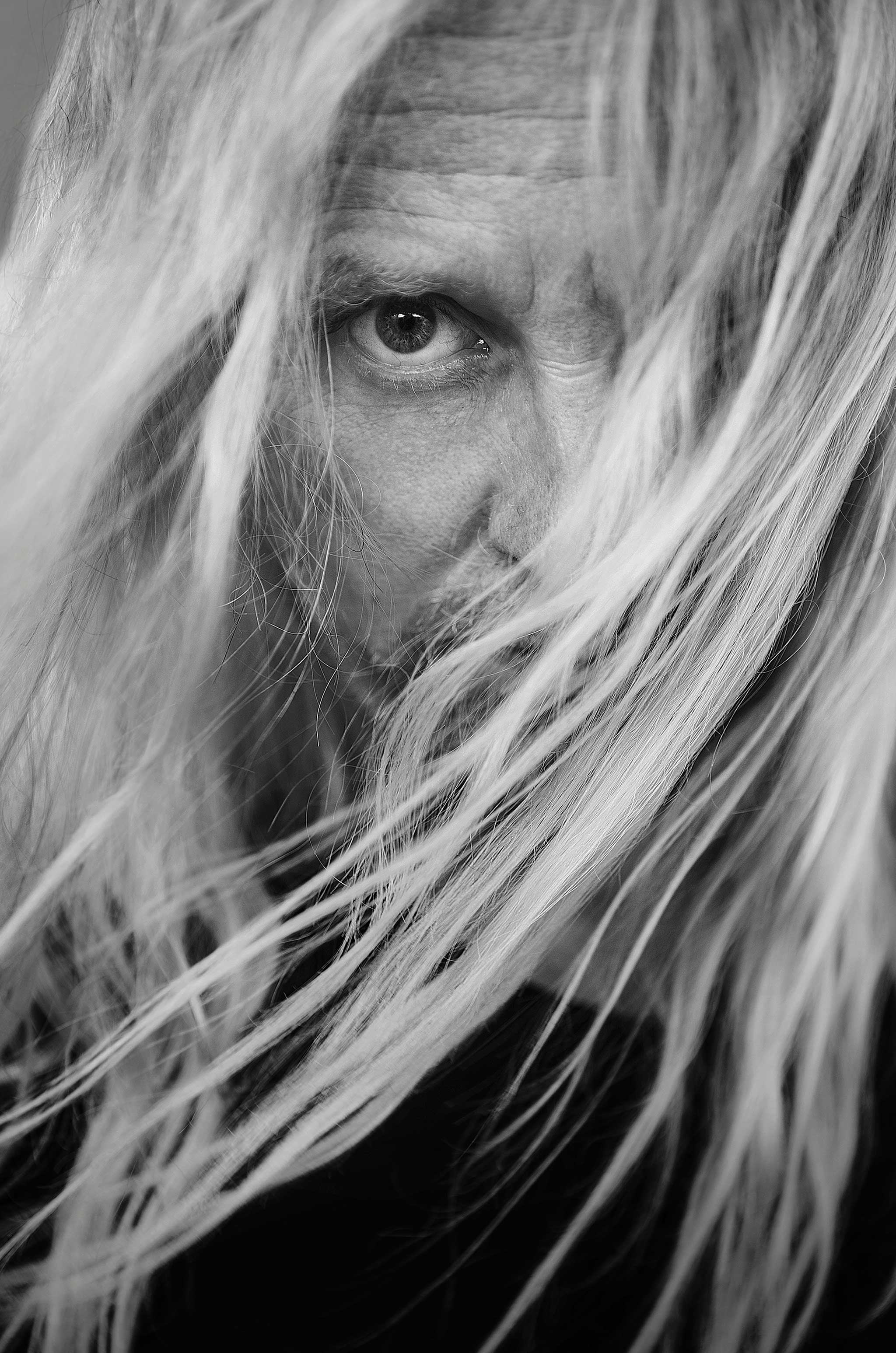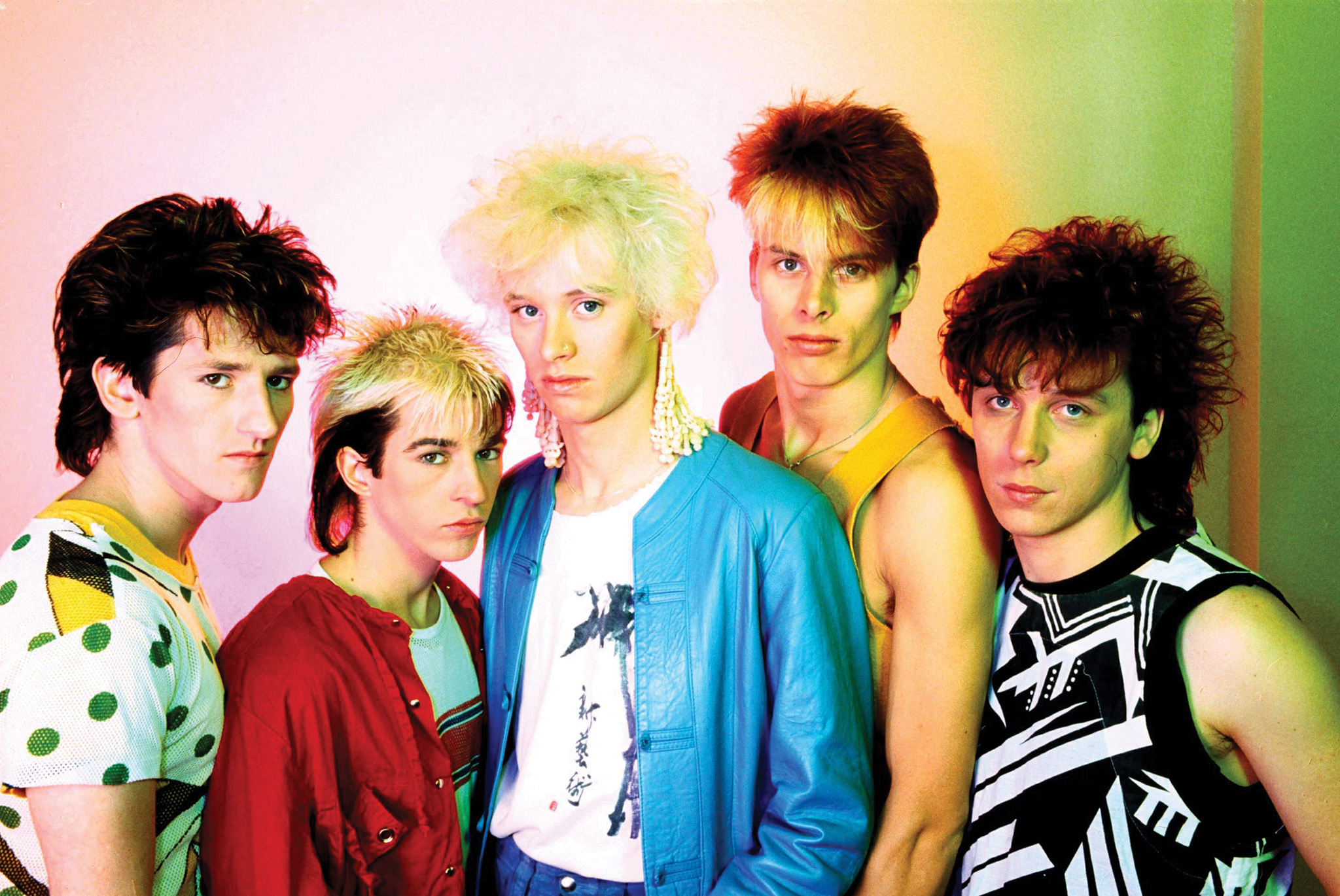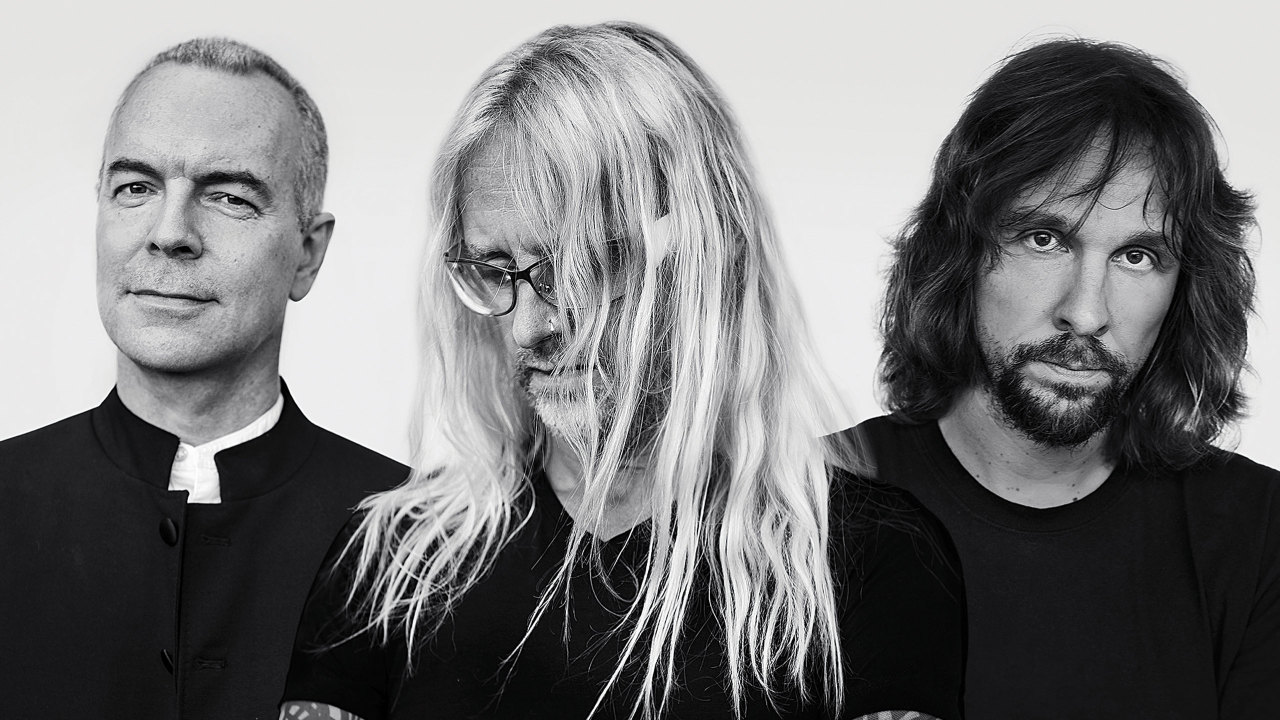You’ll remember his bleach-white pigtails and shades from Steven Wilson and Steve Hackett’s bands. Depending on your age – and your feelings for mullets circa 1983 – you may also remember him as a core member of Kajagoogoo, the short-lived pop sensation behind Too Shy. Today, however, as he embarks on a new project with The Mute Gods – his first major self-led band in years – Nick Beggs is regarded rather differently by those closest to him.
“My wife says I’m like the Pied Piper,” Beggs smiles. We’re talking over the phone, but you can hear the smile. Bassist/Chapman Stick player to the big fish of prog, 80s pop star and father of five, Beggs talks like a children’s storyteller. There’s the twinkly mischief of someone who’s had fun with rock stars, mixed with the quiet seriousness of a responsible parent. A parent who wrote and illustrated a children’s book called Dangerous Potatoes (it really is about dangerous potatoes), but a parent nonetheless.
“I am a child, which is the problem,” he laughs, as we wonder what he was smoking when that idea came to him. “I don’t really need to experiment with any mind-expanding substances.”
We’re talking to Beggs today to get the lowdown on The Mute Gods, for whom the inspiration is rather more centred on real life. Joined by fellow virtuosos Marco Minnemann on drums (Steven Wilson, The Aristocrats) and keyboardist Roger King (longtime Steve Hackett collaborator, who used to play with Gary Moore), Beggs found himself at the forefront of the band, having been a session man for years.
“I had to get back into the headspace of being an artist again, having not really done that for about 30 years,” he says, “and in doing so I recognised a lot of things that I enjoyed about it back then. In a way it’s a bit like a grieving process; going through the process of not being an artist, and putting it behind me. And all of a sudden I was trying to visit it again!”
It seems to have paid off. Do Nothing Till You Hear From Me reveals Beggs as a quality lead singer, as well as an instrumentalist. He says he’s enjoying the frontman role, having seen previous attempts at it knocked back.
“I tried to do it in the 80s, of course, after the ‘K’ word,” he says wryly. “I actually had some pretty heavyweight management. There was a guy called Tony Gordon, he looked after Culture Club, and he said, ‘My dear boy! You’re a superstar!’ It was all very 80s. But nobody would touch me. And I think I lost a lot of confidence.”
Accordingly, he put together a new pop project, Ellis Beggs & Howard, with its own star singer (Austin Howard), and from that point on never thought of himself as a singer. It was only recently when InsideOut Records’ Thomas Waber encouraged him to pursue his own thing that he took the plunge. The result is an eclectic yet cohesive work of progressive rock and avant-pop. On the likes of Feed The Troll, there’s more than a hint of Steven Wilson, particularly the darker, more macabre end of Grace For Drowning, and the twisted ‘industrial jazz’ of The Raven That Refused To Sing (And Other Stories).
“I find it very hard to stay in one genre,” he muses. “I’ve had 32 years of playing pop, funk, soul, some jazz, some classical, and now moving into the rockier, progressive side of things. I’ve had to make a record that at the very least touched on a few of those places. But I hope it sounds suitably ‘of one camp’.”
This involved writing the record three times, and throwing at least two albums worth of material away before the final 11 tracks were settled on. “I had to take it down to something less… extreme, you might say,” he tells us.
Anyone expecting a record full of bass solos and little else will be disappointed. The instrument is a key presence, unsurprisingly, and on the title track, the Chapman Stick becomes a truly multifaceted instrument in Beggs’ hands – rhythm guitar one minute, intriguing lead player the next. He also plays guitar on the record, which he learnt while working with Hackett, having never touched one previously.
“I had three months to learn,” he remembers. “It was like when I played Chapman Stick for John Paul Jones, he said: ‘I want you to play lead when I’m playing bass, bass when I’m playing lead, string sections from the London Symphony Orchestra, Hammond organ and brass, and a solo in the style of Jimmy Page all on one instrument. Do you think you’re up to it?’ And I said: ‘I think I’ve left the iron on…’”

Beggs isn’t the only one in The Mute Gods stepping out of his usual zone. For Minnemann, renowned for mind-melting drum displays, it was a chance to showcase his lesser‑known guitar prowess.
“I think you could put Marco in front of any instrument and he would be great,” Beggs enthuses. “He’s even singing on his records now. He’s just one of those incredibly capable individuals. He can play virtually anything. I just said to him: ‘Do whatever you want, Marco, I really don’t mind. I want you to play drums but anything else you want to do…’ and he gave me so much material we had to really pare it down to the essentials. He was fantastic.”
Indeed, while it’s Nick’s project, The Mute Gods is very much a team effort. At any given point there are three separate guitar parts on Do Nothing…, with Minnemann, King and Beggs playing sections with each other.
“Marco weaved parts in-between what Roger and I had already laid down,” Beggs explains. “He kind of took a symphonic approach to it, which I loved.”
With Beggs working around his tour commitments with Wilson and Hackett, the record came to life across the world in backstage areas, hotel rooms and, erm, a toilet in Italy.
“My dressing room was too noisy,” Beggs reasons, “but I found a toilet at the end of one of the corridors and sat on the toilet, not abluting in any way, but getting some vocals down. It was quieter, and there was a nice reverb in the room. I quite liked it.”
Thematically, and broadly speaking, the record takes a disgruntled look at present-day society. Dystopian shades gleam through notions of ‘darkened skies’ in Strange Relationship. Meanwhile, Feed The Troll – which is Beggs’ ode to the internet trolls he’s engaged with over the years – is creepily unsettling. In a good, classily sinister way.
“Wait till you see the video!” he laughs at this. “I think some people will need some therapy after that. It’s a little bit disturbing. It’s the whole online issue. But I’ve engaged with them and I kind of enjoy it, so this was taking that idea and making a song out of it.”
In closer detail, however, the album is deeply autobiographical, with each song stemming from direct events in Beggs’ life. Father Daughter was written to his actual daughter, Lula, addressing his separation from her mother when she was two-and-a-half (Lula wrote the second verse), while Nightschool For Idiots talks about a past relationship of his. And then there are the ‘mute gods’ themselves…
“Praying To A Mute God, that’s ingrained in some way in me and my particular religious past,” he explains. “I’ve come away from religion with the conclusion that they don’t say anything. Everybody acts on their behalf and speaks out and acts in a vengeful, hateful way… No one can prove the existence of any deity. None of these ‘gods’ have anything to say at any time that can be verified by science or factual literature.”
To understand Beggs’ current anti‑religious stance, you have to look at his past. He had “a tricky childhood in many respects”. His parents separated when he was 10, following years of tension. Beggs, his mother and younger sister were left alone and impoverished as a result. Then, when he was 17, his mother died of cancer.
“The death of my mother made me absolutely damn sure I was going to be successful,” he says.
And he was. Four or so years later, having left art school, Kajagoogoo had a No.1 hit with Too Shy. Craziness and excess ensured, adding up to a turbulent few years. The church offered some much-needed terra firma, and a period of militant Christianity followed.
“I was pretty messed up as a kid,” he says slowly. “And the adulation from Too Shy seemed pretty overwhelming. I think in some ways I turned to religion and faith to help me through that. It kept me focused, so I have got that to be grateful for.”
Indeed, at one point there was even talk of Beggs joining the church professionally. The years, however, proved wearing and he fell out with religion – essentially, he says, “because the gods remain mute”.
“There was a track the record company didn’t want me to include called Jesus Thinks You’re A Fuckwit,” he tells us. “I’d written it and I’m going to try to get it on one of the next records. It was written for the Westboro Baptist Church, basically because even if Jesus is real, I’m sure he’d have something to say about these idiots.” He laughs, a little sadly.
There are no live plans for The Mute Gods, which Beggs is currently viewing as a three-album cycle. “After that I’ll look at it and see if it’s got legs for more,” he says. “I said to the label I didn’t want to do any live work with the band until it got to the second album, to give me a chance to gauge the public reaction.”
Whatever the response, whatever the next moves of Wilson, Hackett and other Beggs collaborators, you sense that he won’t go overlooked for some time – shock of white locks, Chapman Stick chops and all.
“I’ve always felt that the stage is the place where I belong,” he says simply. “We have so much ability in ourselves if we only believe in it. We don’t have to reach out to other deities to help us.”
Magician Man
The many projects of Nick Beggs.

Many ‘lifers’ in the music industry have colourful CVs. The range covered on Nick Beggs’, however, suggests he might top everyone else. Following art studenthood, he began in Art Nouveau, which became Kajagoogoo, before moving on to Celtic prog-folkers Iona. But it’s his session work that spans the real extremes. Since the 80s his clients have included Led Zeppelin’s John Paul Jones, Tina Turner, Kim Wilde, Rick Wakeman, Belinda Carlisle and Steve Howe – as well as Emma ‘Baby Spice’ Bunton and Engelbert Humperdinck. We can’t help wondering if there’s anything he’d say no to?
“I don’t think there is,” he says thoughtfully. “I’m not going to venture into death metal any time soon, but if somebody genuinely wanted me to do something for them and I was at the liberty of doing it, I would do it.”
Most recently, as well as playing for the likes of Lonely Robot, he’s been best known for his work with Steve Hackett and Steven Wilson. Both are excellent bosses, he says, but with their differences.
“Hackett knows the way he wants it to sound, but he expects you to know the way it should sound, so there’s a lot of leeway,” he tells us. “Steven Wilson will tell you exactly what he wants from the moment you leave the house.”
Still, this perfectionism has left a positive mark.
“Steve Wilson is the consummate professional, excellent producer, amazing attention to detail,” he says. “I think that’s what I’ve taken from him – the attention to detail. He very jokingly sometimes refers to me as a very sloppy player! And I know what he means.”
As talk turns to his (ill-fated) pop creation Kajagoogoo, he becomes rather wistful, contemplating what might have been if the band had gone the distance.
“I thought it could have been another Wham!,” he says, rather sadly. “I’m very philosophical about it, but I did have to go through a lot of soul-searching to get myself back on the straight and narrow, because I struggled so hard to make that project work. To have it snapped from me in the way it was, that was totally heartbreaking. It could’ve been really something special. I think most people just remember it as a frothy pop band. But it could have been a lot more.”

